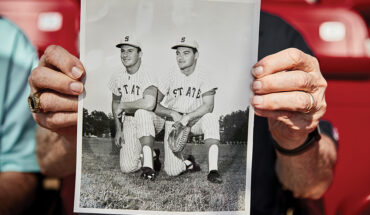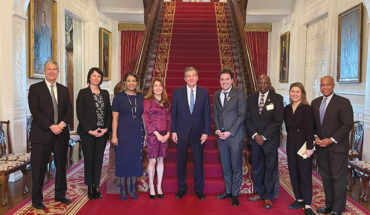by Liza Roberts
photographs by Lissa Gotwals
When Broadway star Lauren Kennedy was growing up in Raleigh, she put in her time doing wholesome-kid things like catching salamanders in the creek near her house, and playing games like freeze tag with her neighborhood friends. But what she – and they – remember most are the plays and musicals she orchestrated, elaborate productions that were advertised with hand-drawn flyers, staged in basements, and took up entire, all-encompassing days.
It was a rag-tag crew, with one exception. “From day one, you knew Lauren was going to be a star,” says Katherine Connell, who grew up in the house behind Kennedy and partook in just about every escapade. “You just knew. When she was performing, her whole persona changed. She got into that character so easily, and was so comfortable in the role.”
Thirty-odd years (and several starring parts on Broadway and on London’s West End) later, Kennedy’s back in town, and in a new role. It’s one she is more than comfortable filling and says she feels born to play: theater company visionary. As co-founder and artistic director of Theatre Raleigh, Kennedy, 40, is no longer the ingenue. This time, she’s calling the shots.
She’s doing that by setting up home here and taking Hot Summer Nights – the summertime series she and her husband, Alan Campbell, have run part-time from their former base in New York since 2008 – and folding it into Theatre Raleigh, a new year-round company. Campbell, 56, is executive director. Though they have separated, they remain a professional team, and share a common vision: To produce top-quality, thought-provoking, intimate theater; to educate and entertain; and to cultivate local talent.
“I’d really like for Theatre Raleigh to be a premier regional theater in this area,” she says. “I feel confident enough now to come back and make an impact. This is my future.” Kennedy has the relaxed confidence and enthusiastic sparkle that allow her to make serious proclamations like this without sounding serious. Instead, she’s charming: ready for a laugh, and bubbling with energy. Combined with her lithe good looks, it makes for a youthful package. It’s only her conversation – filled with thoughtful, summed-up reflections of where she was, is, and will be – that betrays the wisdom that comes with age.
 “The theater was always where my heart was,” she says. “I never wanted to try to be a movie star. I thought it would just be so cool to be a well-respected member of the theater community. And I feel, to a certain extent, that I’ve achieved that.”
“The theater was always where my heart was,” she says. “I never wanted to try to be a movie star. I thought it would just be so cool to be a well-respected member of the theater community. And I feel, to a certain extent, that I’ve achieved that.”
Kennedy and her daughter Riley, 9, are a simpatico duo who have settled in to a stylish and comfortable home in the Budleigh neighborhood; Campbell lives nearby and shares parenting responsibilities. On a recent afternoon, as Kennedy waits for Riley’s school bus to arrive, she considers her daughter’s genetic inheritance: Riley’s already a budding actress. “I don’t want to be a stage mother,” Kennedy says. “my mother wasn’t.”
“Oh, Lord, no,” says her mother, Sara Lynn Kennedy. She didn’t need to be: “When Lauren decided what she wanted to do, she went for it. She has had the passion since she was 4 years old.” Sara Lynn Kennedy is “not surprised at all” to see where her daughter’s career has taken her: to leading roles like Nelly Forbush in Trevor Nunn’s South Pacific in London, Fantine in Les Miserables on Broadway, and The Lady of the Lake in Mike Nichols’ Spamalot.
Back when she first caught the performing bug, Kennedy “wanted to be Marie Osmond.” Then it was Annie. Her love of theater was solidified when her parents took the whole family – Lauren is the third of four children – to New York every Thanksgiving to see shows; they’d fit six shows into four days. North Carolina Theatre became Kennedy’s home away from home and away from school – she graduated from Needham Broughton High School before attending the University of Cincinatti’s College-Conservatory of Music, then joining the cast of Sunset Boulevard.
Kennedy and Campbell have also exposed Riley to a lot of theater, but want her to take the lead herself if she’s going to act. That’s clear a little later, as mother and daughter bounce on their backyard trampoline, chase their tiny Havanese-Maltese mix, Ruby, around the yard, and kid each other about Riley’s audition the next day. She’s up for the role of young Cosette in North Carolina Theatre’s 2014 production of Les Miserables. Kennedy is already cast as Fantine, Cosette’s mother. Riley teases her mother that it’s not fair she didn’t even have to audition to get the role; Lauren gives her daughter a deflecting kiss and changes the subject. As the camera points in their mutual direction, they are alternately campy, silly, affectionate, and poised – in tandem.
Behind them lies a lush culvert with a trickling stream. It’s not unlike the creek a mile or so away where Kennedy found her salamanders, back in her own imaginative childhood.
Kennedy is clearly relieved to be here and not only because it allows her daughter the kind of childhood she couldn’t have in Manhattan. After years in the hothouse intensity of Broadway, where it’s too easy to “lose your creative way” in the chase for the next job, Kennedy says an opportunity to be artistically challenged, to work with local actors, and to build something meaningful in her home town is a rare gift. It’s one she sounds delighted to receive: “Never in a million years would I ever have predicted this,” she says. “I was so focused on being a Broadway actress…but this is the thing I was born to do.”
She certainly looks like a kid on Christmas morning when she’s working. At a technical rehearsal for the recent production of The 25th Annual Putnam County Spelling Bee, Kennedy skips up the aisle, leaps across the stage, and belly laughs as her actors experiment with swinging across the stage on a dangling rope. She does all of this in her pajamas and furry slipper boots, because: why not?
“Oh, this makes me so happy!” she squeals, seeing the ridiculous drooping drawers that make up one character’s costume. She takes matters into her own hands when she needs to, heaving an enormous wheeled set of bleacher seats across the stage, or tying a gigantic knot in the bottom of the dangling rope.
“I remember being really intimidated by her at first,” says Jesse Gephart, who plays the role of goofy homeschooler Leaf Coneybear in the show. “Because, you know, she went off, and she did it.” She made it, he means. Big time, the way they all hope to do. “But she could not be any nicer, and more real, and has a level of professionalism you don’t see a lot.”
It takes a lot of professionalism – to say nothing of talent – to gather a cast of actors (who have day jobs) a mere two weeks before opening night, and cohere them into a cast, creating a top-notch performance. “She casts people who are able to do that,” says Gephart, who does administrative work at Rex Hospital during the day. The short rehearsal time – which reflects the company’s modest budget – means everyone has to step up to the plate, he says. “You bring your A-game all the time.”
The reviews for this show, like those of many that preceded it, prove Gephart right: “The cast seems to thrive under the direction of Lauren Kennedy,” said Broadway World.
To hear Cambell, her former husband, tell it, bringing her A-game is something Kennedy knows a thing or two about. He met her because of it. Campbell was starring opposite Glenn Close in Sunset Boulevard on Broadway (a role that earned him a Tony nomination) when the actress playing the part of the young script editor, Betty Schaefer, was unable to perform. In a scene that sounds as scripted as the musical itself, Kennedy – who only knew the part because she was in the ensemble – was thrust on stage. “She did it so beautifully,” Campbell says. “I was just taken with her talent. I remember, I said: This girl has it. I’ve always just trusted and believed in her talent.”
He’s not alone. De Ann Jones, who founded North Carolina Theatre, where Kennedy got her start as a kid, has coached thousands of young hopefuls, and says Kennedy is one of a handful she’s known who have world-class talent. (Clay Aiken is another).
Kennedy is using that talent today at the Kennedy, a 133-seat, 40-by-60-foot black box theatre behind Memorial Auditorium that is named for her arts-supporting parents, K.D. and Sarah Lynn Kennedy.
That family legacy used to embarrass her; she was worried people assumed she got roles because of it. Her success in New York and London, though, put that to rest, and put it in context. “I’m old enough that I’m not going to look a gift horse in the mouth. We all stand on somebody’s shoulders.”
Another legacy is the summer series itself. It was her father and brother who first began a series in the space called Hot Summer Nights; Lauren occasionally consulted with them as she went about her busy performing career. But in 2008, when her father and brother decided to call it quits, she and Campbell stepped in.
Essentially, they started from scratch – keeping the name, but extricating the series from under the umbrella of her father’s electrical supply company, and making it a stand-alone operation. They’ve run it independently ever since.
Now, they’ve turned it into a nonprofit enterprise. “The business model is almost impossible to make work,” she says: Too few seats, too many expenses. Which makes it no different than all kinds of other arts organizations that run at a loss and make up the difference with donations. Neither Kennedy nor Campbell takes any salary, choosing instead to plow every resource into the growth and success of what they plan to become a year-round operation as they live on savings, and, in Campbell’s case, real estate investments. They envision launching a children’s theater, forming a collaboration with Carolina Ballet, and holding performances in venues all over town. This summer, they have a six-show series that ranges from the comical Spelling Bee musical to the thought-provoking play God of Carnage.
Kennedy, Campbell, and the other staffers like managing director Michele Weathers and associate artistic director Richard Roland all wear plenty of hats to keep the whole thing humming. At a recent staff meeting, Kennedy assures Roland that she’ll teach him to handle the box office phone. She should know; she answers it regularly. A discussion about the proximity of audience seat risers to the stage is resolved when everyone agrees to come in the next Sunday to move them together. They all pitch in to paint sets, sell tickets, and – now that they’re a nonprofit – raise money.
They’re trying to keep expenses low so they can hire great actors; trying to “keep everything on the stage,” as Campbell puts it, “putting quality productions first, and everything else second.” He means investing first and foremost in talent, and not kowtowing to commercial concerns when choosing plays. They want to choose plays instead because they’re good, they’re challenging, and they’re real. “The important thing is to build a core audience of people who trust us,” he says.
“I’m a big believer in putting your best artistic foot forward,” Kennedy echoes. “We’re interested in artistically raising the bar, but we’re all about slow growth. We can’t get there overnight, but we’re being artistically brave. We’re doing shows we’re passionate about.” This season’s God of Carnage is an example; so is the unlikely-sounding musical farce Urinetown.
Kennedy’s not done performing in productions she’s passionate about, either: not only in her own shows, but in those of other companies, like North Carolina Theatre’s Les Mis.
The next day, Riley’s audition for the musical goes well. Her mother stayed out of the room, hearing only a muffled version through the door, but she wasn’t surprised to hear that her daughter got the part. Which means that together, Lauren and Riley will play mother and daughter on stage. Kennedy beams at the thought.
It’s made even more meaningful by the fact that until they moved to Raleigh, Riley had a hoarse voice for a little girl, and wasn’t a big singer. “Alan and I thought, huh, I guess she didn’t get it.” But once they settled in here, that hoarseness vanished, and a clear singing voice emerged. Kennedy’s convinced the child was hoarse from shouting over traffic as they whizzed about New York. Coming to Raleigh helped her find her voice.
Not unlike her mother. Next up for Kennedy: new plays. “I’ve always been passionate about new writers,” she says. “Developing new artists and new talents.” She hosts an annual writers’ retreat to nurture young playwrights and says she spends a lot of time reading new scripts. “I’m interested in contemporary stories, and I’m always looking for new ways to tell stories,” she says, like mixing dance with theatre, or taking a play outside the theatre to the public sphere.
“I have a lot of ideas,” she says. “The whole next step of my life is about taking control and making things happen. I’m excited about the opportunities.”





